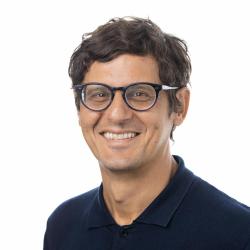Vito Mennella
Back to teamBiography
r. Mennella received his B.Sc. cum laude from the University La Sapienza in Rome, Italy. After receiving a Fulbright Fellowship to continue his studies in the US, he obtained his MSc and PhD in Physiology and Biophysics at Albert Einstein College of Medicine in New York City, where he discovered the cellular mechanism of microtubule depolymerization mediated by Kinesin-13s and studied the mechanism of their regulation (Mennella et al, Nature Cell Biology, 2005; Science Editors’ Choice, 2005; Journal of Cell Biology, 2008). From there, Dr. Mennella joined the Howard Hughes Medical Institute laboratory of Dr. David Agard at the University of California San Francisco as a postdoctoral fellow, where he pioneered application of super-resolution microscopy and advanced imaging methods in organelle cell biology, in particular for analysing centrosome and cilia function. At UCSF, Dr. Mennella was first to describe the architecture of the Pericentriolar Material of centrosomes, debunking a long-standing assumption of its solely amorphous nature (Mennella et al, Nature Cell Biology, 2012; Nature Cell Biology News and Views 2012; Nature Reviews Molecular and Cell Biology Highlights 2012; Trends in Cell Biology, 2014, 2015) In 2014, Dr. Mennella became an Assistant Professor in the Biochemistry Department at University of Toronto, where he applied advanced imaging methods for translational medicine research increasing sensitivity of diagnosis of rare lung disease motile ciliopathy Primary Ciliary Dyskinesia (PCD) and for characterizing novel cellular organelles structures (Sydor et al. Elife, 2018, Liu et al, Science Translational Medicine, 2020, Featured on magazine cover). In 2019, Dr. Mennella became Associate Professor in the National Research Health Center and Biomedical Research center at U. of Southampton where he published the discovery of a novel type of cilium in the airways (Nguyen et al. Developmental Cell, 2020 and Liu et al. Developmental Cell, 2020) and led a collaborative team to discover a new isoform of ACE-2, the receptor of SARS-CoV-2 in airway epithelial cells published in Nature Medicine. In 2021, Dr. Mennella became Director of Research at the MRC Toxicology Unit where he studies the effect of exposure to environmental pollutants and drugs on the airways using advanced imaging technologies and AI image models. Dr. Mennella has received external funding from UKRI-BBSRC, Canadian Institute of Health Research (CIHR), National Sciences and Engineering Council of Canada and new investigator awards from CIHR Institute of Human Development and Child Health, the ATS-PCD foundation, AAIR and other charities.

Department: MRC Toxicology unit
CRSID: vm430

